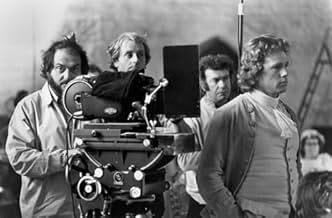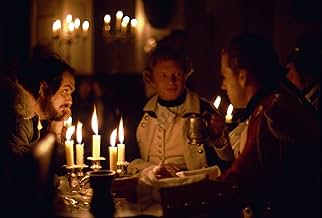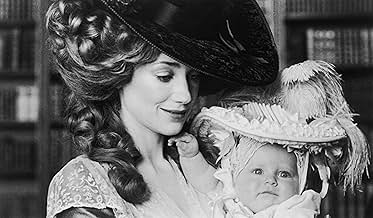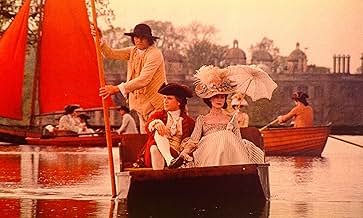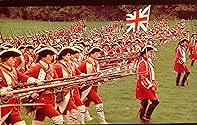एक आयरिश दुष्ट एक अमीर विधवा का दिल जीतता है और 18 वीं शताब्दी के इंग्लैंड में अपने मृत पति की कुलीन स्थिति ग्रहण करता है।एक आयरिश दुष्ट एक अमीर विधवा का दिल जीतता है और 18 वीं शताब्दी के इंग्लैंड में अपने मृत पति की कुलीन स्थिति ग्रहण करता है।एक आयरिश दुष्ट एक अमीर विधवा का दिल जीतता है और 18 वीं शताब्दी के इंग्लैंड में अपने मृत पति की कुलीन स्थिति ग्रहण करता है।
- 4 ऑस्कर जीते
- 17 जीत और कुल 14 नामांकन
Hardy Krüger
- Capt. Potzdorf
- (as Hardy Kruger)
Diana Körner
- Lischen
- (as Diana Koerner)
André Morell
- Lord Gustavus Adolphus Wendover
- (as Andre Morell)
कहानी
क्या आपको पता है
- ट्रिवियाProduction was moved from Ireland to England after writer, producer, and director Stanley Kubrick received word that his name was on an I.R.A. hit list for directing a movie featuring English soldiers in Ireland. Consequently, several scenes were dropped.
- गूफ़The narrator states, early on, "About this time, the United Kingdom was in a state of great excitement". The United Kingdom came into being in 1801, when it merged with the Kingdom of Ireland, before which it was known merely as the Kingdom of Great Britain. In fact the Act of Union of 1707, which joined England and Scotland, refers to "the United Kingdom of Great Britain" or "the United Kingdom" throughout the text. "United Kingdom" was in common use at the time of the film.
- भाव
Title card: [End title card] EPILOGUE
Title card: It was in the reign of George III that the aforesaid personages lived and quarreled; good or bad, handsome or ugly, rich or poor they are all equal now
- इसके अलावा अन्य वर्जनThe 2011 Blu-ray remaster, which also appeared on the digital platforms, plastered the Saul Bass variant of the Warner Bros. Pictures logo with the black and white Warner Bros. Pictures shield.
- कनेक्शनEdited into Hai-Kubrick (1999)
- साउंडट्रैकPiano Trio in E-flat, Op 100 (second movement)
Composed by Franz Schubert
piano: Anthony Goldstone
cello: Moray Welsh
violin: Ralph Holmes
फीचर्ड रिव्यू
(Note: Over 500 of my movie reviews are now available in my book "Cut to the Chaise Lounge or I Can't Believe I Swallowed the Remote!" Get it at Amazon.)
Stanley Kubrick's beautifully opulent production takes many liberties with William Makepeace Thackeray's picaresque romance, The Memoirs of Barry Lyndon, Esq (1843), narrated in the first person depicting events from the eighteenth century. In particular, Redmond Barry who becomes Barry Lyndon, is something of an admirable rake, whereas in Thackeray's novel he is a braggart, a bully and a scoundrel. No matter. Kubrick, in keeping with a long-standing filmland tradition, certainly has license, and Thackeray won't mind.
Ryan O'Neal is the unlikely star, and he does a good job, rising from humble Irish origins to the decadence of titled wealth, employing a two-fisted competence in the manly arts, including some soldiering, some thievery at cards and a presumed consummate skill in the bedroom. Marisa Berenson plays Lady Lyndon, whom Barry has managed to seduce; and when her elderly husband dies, she marries Barry thus elevating his social and economic station in life. But Barry is rather clumsy at playing at peerage, and bit by bit manages to squander most of the Lyndon fortune until his stepson, Lord Bullingdon (Leon Vitali) grows old enough to do something about it.
This really is a gorgeous movie thanks to the exquisite sets and costumes and especially to John Alcott's dreamy cinematography and a fine score by Leonard Rosenman. The 184 minutes go by almost without notice as we are engrossed in the rise and fall of Barry's fortunes. There is fine acting support from Patrick Magee as the Chevalier de Balibari and Leonard Rossiter as Captain Quinn, and a number of lesser players, who through Kubrick's direction bring to life Europe around the time of the Seven Years War (1754-1763) when decadence and aristocratic privilege were still in full flower.
The script features two dueling scenes, the first showing the combatants firing at one another simultaneously at the drop of a white kerchief, the second has Barry and his stepson face each other ten paces apart, but due to the flip of a coin, the stepson fires first. Both scenes are engrossing as we see the loading of the pistols with powder, ball and ramrod, and we are able to note how heavy the pistols are and how difficult it must be to hit a silhouette at even a short distance. It is this kind of careful attention to directional detail that absorbs us in the action and makes veracious the story. Notice too the way the British soldiers march directly en mass toward the French guns. They actually used to fight battles that way! Also note the incredible pile of hair atop Lady Lyndon's head. Surely this is some kind of cinematic record.
Bottom line: one of Kubrick's best, certainly his most beautiful film.
Stanley Kubrick's beautifully opulent production takes many liberties with William Makepeace Thackeray's picaresque romance, The Memoirs of Barry Lyndon, Esq (1843), narrated in the first person depicting events from the eighteenth century. In particular, Redmond Barry who becomes Barry Lyndon, is something of an admirable rake, whereas in Thackeray's novel he is a braggart, a bully and a scoundrel. No matter. Kubrick, in keeping with a long-standing filmland tradition, certainly has license, and Thackeray won't mind.
Ryan O'Neal is the unlikely star, and he does a good job, rising from humble Irish origins to the decadence of titled wealth, employing a two-fisted competence in the manly arts, including some soldiering, some thievery at cards and a presumed consummate skill in the bedroom. Marisa Berenson plays Lady Lyndon, whom Barry has managed to seduce; and when her elderly husband dies, she marries Barry thus elevating his social and economic station in life. But Barry is rather clumsy at playing at peerage, and bit by bit manages to squander most of the Lyndon fortune until his stepson, Lord Bullingdon (Leon Vitali) grows old enough to do something about it.
This really is a gorgeous movie thanks to the exquisite sets and costumes and especially to John Alcott's dreamy cinematography and a fine score by Leonard Rosenman. The 184 minutes go by almost without notice as we are engrossed in the rise and fall of Barry's fortunes. There is fine acting support from Patrick Magee as the Chevalier de Balibari and Leonard Rossiter as Captain Quinn, and a number of lesser players, who through Kubrick's direction bring to life Europe around the time of the Seven Years War (1754-1763) when decadence and aristocratic privilege were still in full flower.
The script features two dueling scenes, the first showing the combatants firing at one another simultaneously at the drop of a white kerchief, the second has Barry and his stepson face each other ten paces apart, but due to the flip of a coin, the stepson fires first. Both scenes are engrossing as we see the loading of the pistols with powder, ball and ramrod, and we are able to note how heavy the pistols are and how difficult it must be to hit a silhouette at even a short distance. It is this kind of careful attention to directional detail that absorbs us in the action and makes veracious the story. Notice too the way the British soldiers march directly en mass toward the French guns. They actually used to fight battles that way! Also note the incredible pile of hair atop Lady Lyndon's head. Surely this is some kind of cinematic record.
Bottom line: one of Kubrick's best, certainly his most beautiful film.
- DennisLittrell
- 5 फ़र॰ 2002
- परमालिंक
टॉप पसंद
रेटिंग देने के लिए साइन-इन करें और वैयक्तिकृत सुझावों के लिए वॉचलिस्ट करें
विवरण
बॉक्स ऑफ़िस
- बजट
- $1,10,00,000(अनुमानित)
- दुनिया भर में सकल
- $2,79,084
- चलने की अवधि3 घंटे 5 मिनट
- रंग
- ध्वनि मिश्रण
- पक्ष अनुपात
- 1.66 : 1
इस पेज में योगदान दें
किसी बदलाव का सुझाव दें या अनुपलब्ध कॉन्टेंट जोड़ें





